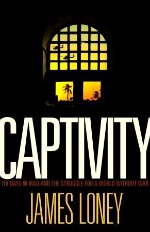|
8/22/2011 Comments Book Review: CaptivityBy: Christopher Knestrick  Captivity: 118 days in Iraq and the Struggle for a World without War by James Loney, a member of the Christian Peacemaker Teams (CPT) and a Catholic Worker is a great book for anyone seeking to create peace and justice in this world. The book is the story of when James Loney and three other Christian Peacemaker Teams members, Tom Fox, Harmeet Singh Soode, and Norman Kember, were kidnapped in Iraq while participating in a delegation and held for 118 days. It is a book about humanity in all its paradoxes—a humanity that searches for freedom and forgiveness in the midst of war. The Christian Peacemaker Teams started in 1986 with a question, “What would happen if Christians devoted the same discipline and self sacrifice to nonviolent peacemaking that armies devoted to war?” Struggling to live out this question, CPT began to ally with local nonviolent peacemakers around the world who are risking their lives to bring peace and justice to their communities. Today, CPT has teams in Colombia, Iraq, Palestine, and Canada. For example, in Colombia, CPT partners with CAHUCOPANA (Corporation for Humanitarian Action and Peaceful Coexistence in Northeast Antioquia), a peasant organization started in 2004 after years of repression from the Colombian Armed Forces and paramilitaries which are supported by the United States. The community has organized themselves and is demanding respect and the end of the human rights violations. Despite the repression that continues today through food and medicine blockades by the army and paramilitaries, death threats, and selective assassination of their leaders, CAHUCOPANA continues to seek peace and justice. Captivity takes place in 2005 and recounts the work of CPT in Baghdad, Iraq during the height of the war and occupation. During this time, the CPT Iraq team was involved in documenting the torture of Iraqis being held in prisons around Iraq by the United States—work that eventually helped break the Abu Ghraib story in April 2004. It was in this reality that 4 Christian Peacemaker find themselves in captivity. James Loney tells his story through the human experience -the real human experience of being a peacemaker in a place at war. In the book, the peacemakers don’t make peace . The war continues to rage. People continue in captivity all over the world. There is no hero in the story. However, he does show us that peacemaking can be done daily in the worst of circumstances in small ways. It is done in his resistance to the dehumanization of captivity—the cleaning of the room and the washing of the clothes. It is done in the daily struggle to see his kidnappers as human beings – the praying for the captor’s sick sister and the massaging of the back of his captors. Through the telling of his experience, Loney speaks to a world that searches for liberation from the captivity of violence and war. He writes as a reminder of the true human cost of war: the hundreds of thousands of Iraqis that have been killed, the young soldiers occupying the country that have lost their lives, and of course Tom Fox, who was taken away and killed on the 79th day of captivity. He writes on day 111, “Killing—any kind, no matter for what—all killing disgusts me. I’m sick to death of it. Seeing it on the news, hearing about it, watching movies about it. The glorification and idolization of it. The money that’s spent on it. The orders and justifications for it. There must come a day when killing will finally be seen for what it is: a collective insanity, a moral scourge, a blasphemy against God and against the human.” Furthermore, Loney’s experience shows the terrible cycle of violence that we have created, while also demonstrating a way out of it—forgiveness. As Loney states at the end of the introduction, “It is the story of my captivity and what I saw there—of the human spirit and freedom, of violence and the war and the way to find our liberation from it. As with any paradox, there is no answer to it; it can only be lived. I tell this story in hope that we might yet find another way.” Thank you for sharing your story James Loney.
Comments
|
Disclaimer
The viewpoints expressed in each reader-submitted article are the authors own, and not an “official Jesus Radicals” position. For more on our editorial policies, visit our submissions page. If you want to contact an author or you have questions, suggestions, or concerns, please contact us. CategoriesAll Accountability Advent Anarchism Animal Liberation Anthropocentrism Appropriation Biblical Exegesis Book Reviews Bread Capitalism Catholic Worker Christmas Civilization Community Complicity Confessing Cultural Hegemony Decolonization Direct Action Easter Economics Feminism Heteropatriarchy Immigration Imperialism Intersectionality Jesus Justice Lent Liberation Theology Love Mutual Liberation Nation-state Nonviolence Occupy Othering Pacifisim Peace Pedagogies Of Liberation Police Privilege Property Queer Racism Resistance Resurrection Sexuality Solidarity Speciesism Spiritual Practices Technology Temptation Veganism Violence War What We're Reading On . . . White Supremacy Zionism ContributorsNekeisha Alayna Alexis
Amaryah Armstrong Autumn Brown HH Brownsmith Jarrod Cochran Chelsea Collonge Keith Hebden Ric Hudgens Liza Minno Bloom Jocelyn Perry Eda Ruhiye Uca Joanna Shenk Nichola Torbett Mark VanSteenwyk Gregory Williams Archives
October 2017
|
Search by typing & pressing enter


 RSS Feed
RSS Feed